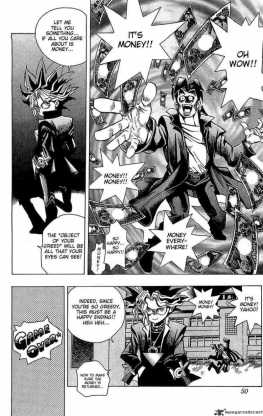Yu-Gi-Oh! Volume 1
I came to the whole manga/anime scene a little later then you might expect. The majority of people, it seems, tend to embrace it in their early teens, and shed it pretty sharply before adulthood; in my case, I wholly embraced it in my early adult-hood and can’t seem to keep myself away from it. A worrying cycle, and one which I have difficulty explaining whenever my interest/obsession is revealed in public.
For the uninitiated, ‘manga’ and ‘anime’ would translate most easily to ‘comics’ and ‘animation’, and refers to anything made in or influenced by Japan. As a sub-culture in the western world, the U.S. seems to be the place where it has gained the most traction. Dragonball Z and Pokémon are two examples from the top of my head of series that have gained the most appeal in the west. But the whole industry generally is still very much specialist, and (in my view) against the mainstream. Another series I can claim to have a long-standing interest is the Yu-Gi-Oh franchise, in it’s many myriad forms.
‘But isn’t ‘Yu-Gi-Oh!’ that ridiculous children’s show about card games?’, I hear one of you mutter (in my head, if nothing else). And you’d be correct. As East-to-West adaptations go, the Yu-Gi-Oh! TV series is only just scraping the bottom of the barrel; laughable english dubs, bizarre story alterations and a borderline baffling level of censorship. 4Kids, the company responsible for dubbing the show, did make attempts to amend this by offering uncut versions of the episodes but, for whatever reason, only a handful of these volumes were released before they were quietly discontinued. For those of a confused, audacious nature, original collections of the Japanese episodes with horrendous english subtitles can be tracked down. Just have your Japanese dictionary on-hand at al times.
But before the anime series (plural), came the manga series, a familiar journey in Japan. Manga artists produce a popular series, which is then produced into an adapted anime series. First serialised in Weekly Shōnen Jump (a comic book aimed at young teenagers) in 1996, the series remains the first and only major success for its creator, Kazuki Takahashi. The story revolves around a teenager named Yugi Mutou, who has inherited a mysterious item from ancient Egypt known as the Millennium Puzzle. After successfully completing the puzzle in the opening chapter of the story, he brings about the return of the ‘shadow games’, and the Puzzle’s last owner, who uses the ‘shadow games’ to inflict punishment on deserving adversaries of Yugi and his friends, Katsuya Jonouchi (Joey Wheeler), Hiroto Honda (Tristan Taylor) and Anzu Mazaki (Téa Gardner).
If, at this stage, you are wondering how the ‘Duel Monster’s’ game is involved, you may be disappointed to learn that it doesn’t initially. Innocently introduced in chapter 9, it only becomes a mainstay in the plot after the seventh volume. Instead, each chapter typically revolves around a particular type of game (board, card, table-top…quite a few, as it transpires). A somewhat formulaic pattern, but this is pretty standard for most manga series (Bleach, for example, devolves into an almost farcical cycle of repetition). If nothing else, Takahashi can be praised for his creative flair when it comes to deploying both his knowledge of many different games and in using them as successful plot devices. In this respect, the manga appeals well to its target audience (younger males), whilst risking alienating older and female audiences.
There is also a distinctly dark undercurrent, epitomised most easily in the form of Yami Yugi, the inhabitant of the Millennium Puzzle. The volume’s first chapter involves Yugi getting on the wrong-side of a school bully, who demands Yugi pays him for ‘protection’. The ‘other Yugi’ manifests himself and challenges the bully to a partially sadistic game involving a knife and yen notes. As you would expect, the ‘other Yugi’ wins, and the bully faces a forfeit in the form of a penalty game (illustrated below), and it’s examples like this that make the manga ‘sadist-lite’ in its execution.
The appeal for me comes from the whole Egyptian subplot, which works incredibly well as a story device for the entire series, even after Duel Monsters becomes the series sole focus. The pay-off for this particular plot device is quite long, however, and is only truly resolved after 3 long story-arcs; for the Egyptian-card-hating nutters out there, be prepared to wade through many Duel Monsters battles before you have any chance of getting
I’ll always have a soft-spot for Yu-Gi-Oh. I still like to play the card game occasionally (the same can’t be said for other contenders) and even find myself watching the anime – and reading the manga – again and again. Whilst the manga nowhere near matches the utter genius and scope of classic series such as Akira, there is something alluringly Pokémon-esque about the whole franchise. Maybe it’s the focus on games. Maybe it’s the Egyptian sub-plot. Or maybe it’s just the surprise of how different the manga is, when compared with the english TV show. In the words of Yugi himself, my attraction to this series can be described as ‘something you can show, but can’t see’. So I tip my hat to you, you crazy haired, game-obssessed, goofball.
(Cover art courtesy of amazon.co.uk; Yu-Gi-Oh! manga frame courtesy of mangareader.net; Yu-Gi-Oh! is a registered trademark of Kazuki Takahashi 1996 etc etc please don’t sue me)

